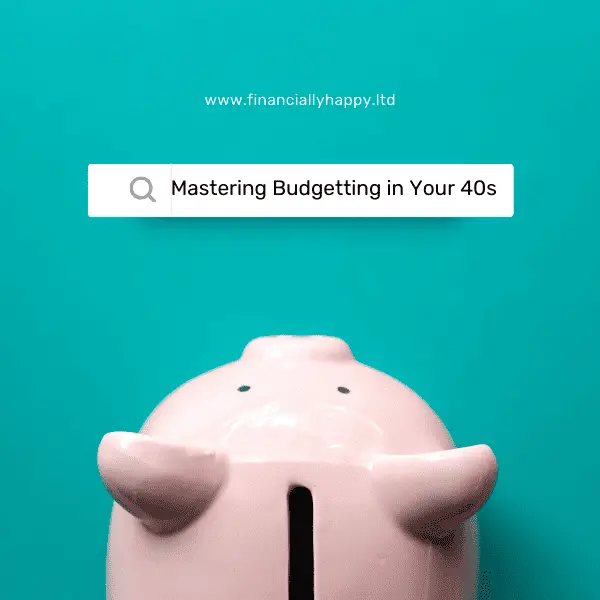Money worries making me ill (Key steps to reduce your money anxiety)
Money worries making me ill is a common position to be in when you feel like it is all becoming to much.
If you have found yourself feeling ill due to money worries, it might be time that you try and address them head-on.
It can be that you have no idea where it all goes or that not enough is coming in.
Worry about money can be a great source of stress and anxiety.
Here are a few ideas to help build good money habits while taking immediate action on any money worries making you ill.

How do financial issues impact your mental health?
Worrying about money can have many knock-on effects into your daily life, health and chances of wealth.
If you worry a lot about money, it can cause you to have sleepless nights, keeping you awake thinking about all the money you need to pay back.
The lack of sleep can have multiple knock-on effects. The lack of adequate sleep has been connected to many poor health outcomes. These can include a lowered immune system, ongoing tiredness and irritability.
If you are struggling with financial anxiety, it can also mean that you are often distracted thinking about money. This might mean you are not able to give your best to your work or and personal life.
Worrying about money all the time can also mean that you are distracted a lot, while at work and at home, potentially leading to further difficulties in making everyday and essential decisions.
Having difficulties making good decisions can lead you to further money problems.
How do I stop stressing about money?
If money is starting to keep you up a night, it’s probably time to shine a light on the problem.
Having clarity on what is going on is part of the key to taking decisive action.
You might say I have no money, but a crucial part of that is why you have no money? Where is all your money going? Unless it’s being stolen, then it’s being given away by YOU!
Who are you giving your money to? And are you happy with that?

What’s in your wallet?
Where is your money? Understanding this can be a vital part of starting to move the stress. Knowing what is going on will help remove some of the mystery about what is going on.
- Is it in a bank account?
- What’s the interest rate?
- Is it sat on credit cards? If so, how much and at what interest rate?
- Do you have short term, medium-term, and long-term savings? Where and what value are they?
Get a piece of paper or a spreadsheet and write out where your money is.
What do you want your money to do for you?
This might seem like a strange question with food, water, shelter and medicines being the critical areas for us to use your money on.
But these areas are probably connected with not wishing to go hungry, thirsty, be cold or outside and not being sick.
These are, in part, what we want our money to do for us. Of course, we might also like some non-essentials or luxuries to make life more comfortable and interesting.
If you think of money like that it might help steer how you spend your money, i.e., does that extra pair of shoes really stop me from being cold or is it just a want?
What’s the difference between what you want right now and what you want most?
If you want most not to worry about money, then maybe you need to ensure you have habits that help you make better decisions and steer you away from the immediate gratification of stuff or doughnuts.
More stuff or less worry?

What is your money for?
A potential way to think about what you want your money to do for you is giving you more;
- Freedom – including from work one day.
- Security – from when things go wrong.
- Independence – so that you are not dependent on the kindness of strangers to help you out.
- Dignity – so you can live in the style you would like.
- Options – creating more opportunities now and in the future
All of these allude to some form of financial independence.
Looking at your money like this might help you use your money differently and lead to you working towards things that take your money worries away.
Thinking about what habits might lead to freedom, security etc. might help speed you up to becoming financially happy.
What habits do you have that are causing financial stress?
Do you shop on impulse? Have multiple credit cards only paying the minimum amount?
Do you regularly overspend and under save?
Do you make any plans or just live from day today?
Do you spend and then save or save and then spend?
Some of these habits, ways of thinking and acting may well be part of why you don’t seem to keep much of your money and are worrying about it.
What would good financial habits look like?
I bet you probably already know a few of these ideas, but how many of them are you doing?
Good financial habits might well look like these.
- Saving regularly for short-, medium- and long-term needs.
- Saving first and then spending what is left.
- Tracking your finances
- Living towards a spending plan
- Regularly review your spending, saving and investing to ensure all is well.
- Looking for ways to reduce your costs, including tax (legally of course)
- Looking for ways to increase your financial literacy through podcasts, books, or coaching.
Would any of these processes or habits help you worry less about money?

All those windows look square to me, would you like more options?
Summary table: money worries making me ill
| Aspect | Questions to Ask | Action Steps | Things to Consider |
|---|---|---|---|
| Identifying the Problem | Why am I stressed about money? | Self-assessment to identify the root cause. | Consider external and internal factors. |
| Physical Symptoms | Am I experiencing headaches, muscle tension, or sleeplessness? | Consult a healthcare provider. | Stress can manifest physically. |
| Mental Health | Is my stress affecting my emotional well-being? | Seek mental health support. | Financial stress can lead to anxiety and depression. |
| Work and Personal Life | Is my financial stress affecting my work performance or relationships? | Address the issue directly or seek professional help. | Stress can have a ripple effect. |
| Budgeting | Where is my money going? | Create a budget and stick to it. | Track income and expenses. |
| Debt Management | Do I have debts that are causing stress? | Make a plan to pay off debts. | Consider interest rates and payment terms. |
| Savings and Investments | Do I have savings for emergencies? | Start saving and consider investments. | Think short-term, medium-term, and long-term. |
| Financial Literacy | How well do I understand financial management? | Educate yourself through books, podcasts, or coaching. | Knowledge is power. |
| Professional Help | Should I consult a financial coach or advisor? | Seek professional advice. | Sometimes expert guidance is necessary. |
| Self-Care | What am I doing to manage stress? | Implement stress management techniques. | Exercise, meditation, and relaxation methods can help. |
FAQ: Money worries making me ill
Can financial stress make you sick?
Yes, financial stress can make you sick. The effects of financial stress can result in physical symptoms like headaches, muscle tension, and even heart palpitations.
It can also lead to emotional distress, causing anxiety, depression, and irritability. Financial stress can also negatively impact your relationships, work performance, and quality of life.
Taking financial stress seriously and addressing it with practical solutions and self-care is essential.
How do you overcome money worries?
To overcome money worries, it’s essential to identify the root cause of your financial stress and create a plan to address it.
This may involve budgeting and tracking your expenses, saving for emergencies and future goals, paying off debt, and increasing your income.
Seeking professional help from a financial planner or credit counsellor can also be beneficial.
Additionally, practising self-care and taking care of your physical and mental health is crucial in managing and reducing money worries.
What is money anxiety disorder?
Money anxiety disorder is a condition characterized by excessive worry and fear related to financial matters.
It can cause significant distress and impair a person’s ability to function in daily life.
Symptoms may include constant worrying about financial stability, avoiding financial responsibilities, and feeling ashamed about one’s financial situation.
Treatment may involve therapy, stress management techniques, and financial education. If you are experiencing symptoms, seek help from a mental health provider.
What is money dysmorphia?
Money dysmorphia is a term used to describe a distorted perception or obsession with money. It can manifest in various ways, including overspending, hoarding money, and feeling like one’s self-worth is tied to their financial status.
Money dysmorphia can be caused by various factors, such as childhood experiences with money or cultural and societal pressures. It can also co-occur with other mental health conditions like anxiety and depression.
Treatment for money dysmorphia may involve therapy, stress management techniques, and financial education. If you are experiencing symptoms, seek help from a mental health provider.
Final thoughts: Money worries making me ill.
Money can be a source of anxiety and worry. If you are tired of struggling financially, it’s time to take some steps toward financial security and stability.
Learning how to earn more, keep more and grow what you have for short and long-term needs can result in less sleepless nights.
Taking more control over your finances will help reduce your money worries.
Figure out what’s going on.
Using a piece of paper or an app to track what is going on will help shine a light on where it’s all going.
Consider what your money is for
More stuff or more freedom, security, dignity, options or independence?
Reduce your outgoings.
Tracking your money will also help show where there might be areas or ways to reduce or cut out some spending.
You could shop at cheaper places, look for better offers or cut out what you no longer need or value.
Set some goals and track them.
Having some life goals, whether the short, medium or long term, will help you focus on what’s important and why to save some money.
If you have something specific to spend your money on, now, shortly and a long time away it will help you save money now.
Start some good financial habits.
What you do regularly will result in your long-term success or failure. Start tracking, managing and saving your money now. It will result in far better financial outcomes than doing nothing and spending all your money like there is no tomorrow.
Anyway, those are my thoughts on money worries making me ill, let me know yours in the comments below.
Good luck out there.
If you’ve made it this far, congratulations! You’re already taking steps towards a healthier financial future. But maybe you’re feeling a bit overwhelmed. Maybe the of budgeting, saving, and investing still makes you break out in a cold sweat. Don’t worry, you’re not alone, and help is available.
At Financially Happy Money Coaching, I understand money isn’t just about numbers. It’s about emotions, behaviours, and life choices. That’s why we’re here to help you take the stress out of money and build wealth that aligns with your values and lifestyle.
Whether you’re just starting out on your financial journey or you’re looking to take your finances to the next level, we’re here to guide you every step of the way. I’ll help you understand your financial behaviours, set realistic goals, and create a personalized plan to achieve those goals.
So, why wait? Start your journey towards financial happiness today. Remember, the best time to start was yesterday. The second best time is now.
Click here to schedule your consultation and let’s make your money work for you, not vice versa. 💪💰
Remember, financial freedom isn’t a destination; it’s a journey. And every journey is easier when you have a guide. So, let’s embark on this journey together and create a financially happy future. 🚀💸
📚 Financial Freedom Resources
- The Ultimate Guide To Building Your Savings to $100,000! 📘 is a transformative book that equips readers with principles, strategies, and the mindset 🧠 needed to reach a $100,000 savings goal 💰. It’s a journey towards financial freedom 🚀, challenging beliefs 🤔, embracing new habits 🔄, and overcoming obstacles 💪.
- How to Manage Your Finances: Your Guide to Financial Freedom 📘 is a comprehensive resource packed with practical advice on budgeting 💰, investing 📈, reducing debt 💳, and building wealth 💎. It’s an essential guide for anyone, novice or experienced, aiming to take control of their financial future and achieve financial independence 🚀.
Remember, self-study is a powerful tool for life and financial transformation. Happy reading! 🎉










